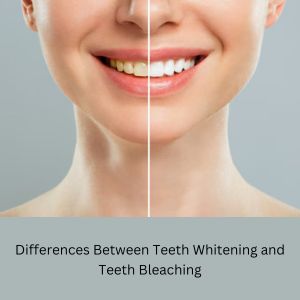What Is Teeth Whitening?
Teeth whitening refers to any procedure that lightens the color of your natural teeth. It involves the removal of stains or discoloration that occur on the surface of your teeth. Whitening treatments work by using mild abrasives or bleaching agents to break down or remove surface stains, giving you a brighter appearance.
Common Methods of Teeth Whitening:
- Whitening Toothpastes: Contain mild abrasives that help scrub away surface stains.
- In-Office Whitening Treatments: Professional treatments performed by a dentist, such as teeth whitening in Gurgaon at Inspire Dental and Esthetic Care.
- Take-Home Kits: Custom trays filled with whitening gel to be used over time for gradual results.
Who Should Consider Teeth Whitening?
- People with surface stains caused by food, drinks, and smoking.
- Those who want to enhance the brightness of their teeth without altering their natural tooth color.
What Is Teeth Bleaching?
Teeth bleaching, on the other hand, is a more intense process designed to lighten teeth that are not only stained but also have deep discoloration. Teeth bleaching uses stronger chemicals, such as hydrogen peroxide or carbamide peroxide, to break down deeper stains and restore the teeth’s natural shade or lighten them further.
Unlike whitening, which mainly targets surface stains, bleaching is more effective on teeth with intrinsic stains, which are often caused by aging, trauma, or medication.
Common Methods of Teeth Bleaching
- Professional Bleaching Treatments: Done in a dental office with stronger bleaching agents.
- At-Home Bleaching Kits: Custom kits provided by the dentist that involve more potent bleaching agents than over-the-counter products.
Who Should Consider Teeth Bleaching?
- People with deep or intrinsic stains (such as those from antibiotics or injury).
- Individuals seeking dramatic whitening results beyond surface stains.
Key Differences Between Teeth Whitening and Teeth Bleaching
1. Target Stains
- Teeth Whitening: Primarily focuses on removing extrinsic stains, which are surface-level stains caused by foods, drinks, smoking, or poor oral hygiene.
- Teeth Bleaching: Targets intrinsic stains, which are deeper, internal stains often caused by aging, medications, or excessive fluoride.
2. Active Ingredients
- Teeth Whitening: Uses lower concentrations of peroxide or other agents to remove stains from the tooth surface. Common agents include carbamide peroxide and hydrogen peroxide.
- Teeth Bleaching: Uses higher concentrations of bleaching agents, typically stronger hydrogen peroxide, to penetrate deeper into the enamel and even the dentin to lighten the overall tooth color.
3. Treatment Methods
- Teeth Whitening: Can be done using over-the-counter products like whitening toothpaste, strips, or professional at-home kits provided by dentists.
- Teeth Bleaching: Generally performed in-office by a dentist, as the higher concentration of agents requires professional supervision for safety and effectiveness.
4. Results
- Teeth Whitening: Results in the removal of surface stains and lightens the color of the teeth slightly. It may not significantly alter the intrinsic color of the teeth.
- Teeth Bleaching: Provides more dramatic results, lightening both surface and internal stains, making it suitable for those with deeper discoloration or more stubborn stains.

5. Duration of Results
- Teeth Whitening: Results are temporary and last a few months, especially if habits like smoking or drinking coffee continue.
- Teeth Bleaching: Results tend to be longer-lasting, often providing a noticeable difference for up to a year, depending on oral care and lifestyle.
6. Treatment Duration
- Teeth Whitening: Takes longer to see noticeable results, especially with at-home products, which may take several weeks.
- Teeth Bleaching: Professional bleaching treatments offer faster results, with significant whitening achieved in just one session.
7. Safety
- Teeth Whitening: Generally safe with minimal risk, but can cause some tooth sensitivity if overused or if abrasive products are used.
- Teeth Bleaching: While safe when done professionally, bleaching can cause temporary sensitivity or gum irritation due to the stronger agents used.
8. Cost
- Teeth Whitening: Generally more affordable than bleaching. Over-the-counter options are very budget-friendly, and even professional whitening treatments tend to be less expensive than bleaching treatments.
- Teeth Bleaching: Because of the stronger agents and professional care involved, bleaching tends to be more expensive. The price reflects the intensity and effectiveness of the procedure
9. Effect on Fillings, Crowns, and Veneers
- Teeth Whitening: Whitening treatments usually have no effect on dental restorations like fillings, crowns, and veneers. This means that while your natural teeth may whiten, the restorations will remain the same color, which can sometimes lead to an uneven appearance.
- Teeth Bleaching: Similar to whitening, bleaching does not alter the color of fillings, crowns, or veneers. However, if you’re concerned about matching these restorations with your newly bleached teeth, it’s a good idea to discuss this with your dentist.
Which Treatment Is Right for You?
- Teeth Whitening: If you have relatively mild surface stains caused by food, drinks, or smoking, teeth whitening may be the best solution. It’s ideal for people who want a simple, safe, and effective way to enhance their smile without the need for deep treatments.
- Teeth Bleaching: If you have more persistent, deeper stains—whether from age, medications, or genetics—teeth bleaching will provide faster and more dramatic results. It’s particularly effective for those who want a significant transformation and are looking for professional help
Conclusion
Both teeth whitening and teeth bleaching are effective methods for brightening your smile, but the right treatment for you depends on the type and severity of the stains. Teeth whitening is a more gentle, surface-level approach, while teeth bleaching tackles deeper stains and provides more dramatic results.
If you’re considering enhancing your smile, visit Inspire Dental Clinic, to explore your options for teeth whitening or teeth bleaching. Our team of experts will help you choose the right solution based on your goals and dental health.

